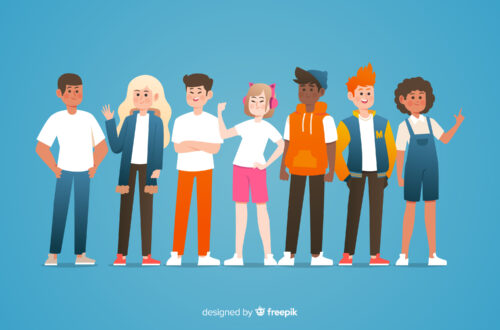10 Things I’d Do As a Digital Learning Coach
My Big Takeaways From DEL
10-things-i-d-d_54478774As my Masters in Digital Education Leadership program comes to a close, I have spent a significant amount of time reflecting on what I’ve learned and how much I’ve grown. Coaching is a dynamic job requiring one to be knowledgeable, flexible, and relatable. It’s hard to narrow down the essential elements of being a Digital Learning Coach because they have many roles and responsibilities. Below are my 10 big takeaways from my time in the DEL program; lessons that I know will impact my future as an educator.
1. Relationships are Key
Coaches won’t make an impact if they don’t first develop a trusting relationship with the teacher. So start slow. Get to know each other, ask questions, listen, and smile often. Have chocolate handy and remember that teaching is personal. Educators pour so much of their soul into their craft that being vulnerable is hard. So as a coach take the time to develop trust and think carefully about how you can encourage, empower, and support the teachers you work with.
2. Coaching Roles
Coaches have more roles to be than just “the expert”. In fact, my master’s program continually highlighted how much I didn’t know. Coaches don’t have to be an expert, but they should be skilled communicators who are experienced at lesson design, best practices, and tech integration and are able to interweave all of these components when helping teachers design curriculum and assessment (Mraz et al., 2016). Coaches should be able to facilitate professional learning or one-on-one meetings when working through a coaching cycle. They spend a large amount of time collaborating with teachers helping them plan, implement, and evaluate activities (Foltos, 2013). But I think most importantly, coaches are change agents. They help teachers reflect on and improve their practice and encourage them to try new things.
3. Communication Skills Needed
While most coaches are effective communicators there are certain skills that take intentionality and practice, such as setting norms, active listening, paraphrasing, and asking probing questions. One big take away for me was recognizing that I need to spend a lot more time asking questions and listening than talking. A coach’s goal should be to help teachers build capacity to make their own instructional decisions. If coaches acted as the expert with all the answers, teachers would shy away from sharing their thoughts and would become over-dependent on the coach to come up with solutions.
4. Technology Should Not Be the Focus
The focus should be on pedagogy, content, and student learning. After the learning activity is created THEN the teacher and/or students can help choose the technology that will best help them accomplish the task. “Too often, teachers still plan their lessons around technology instead of putting learning first” (Foltos, 2013, p. 136). Annie Tremonte, a digital learning coach in Renton, Washington uses this analogy when working with teachers to highlight how we can become overly focused on technology: “No one ever said ‘Wow, Elmer’s glue is amazing. How can I design a whole lesson just around Elmer’s glue?’ Yet oftentimes we start with the technology we want to use and try to build a lesson around that. Why?” Coaches can help teachers focus first on student learning, and then choose the technology that helps students achieve those goals.
5. Be a Life-Long Learner
Coaches need to work hard to stay current with innovative practices. They continually take the time to research, contribute to online professional learning communities (PLCs), curate resources for teachers, and tinker with new technology.
6. Twitter!
I didn’t realize what I had been missing out on. Twitter is a fantastic source for educators to follow emerging technologies and best practices. You can curate resources and network with other teachers around the world. Twitter is also a great way to advertise the cool things that teachers are doing at your school. Learn more about how to use Twitter as a PLC in Cory Cumming’s blog.
7. How to Rock PD
Teachers want professional learning that is relevant, interactive, teacher-led, and sustained over time (Bill and Melinda Gates Foundation, 2014). During my graduate studies I learned more about adult learning theories and discovered different ways to make professional learning engaging and personalized. I can’t to host an EdCamp, organize inquiry-based PD, or try out some microcredentials myself.
8. Technology Procurement
Acquiring new technologies is exciting, but should be done thoughtfully and responsibly. There are a lot of items to consider when shopping for new tech (check out my blog post to read more). Take the time to research, involve various stakeholders in the discussion, consider student demographics, and pilot new tech. You won’t regret it.
9. Equity Matters
One of my goals as a teacher or Technology Coach is to fight for every student’s right to an equitable learning experience. During my graduate studies, I became aware of the digital divide in our nation and in the world at large. As the divide grows, it feeds new forms of digital discrimination. Think of the advantage some students will have if only the wealthy school districts can purchase one-to-one devices and state-of-the-art tech. But it is not just owning devices that will fix the problem. As digital education leaders, we need to push curriculum developers to design tools and content that fit the needs of diverse learners.
10. It Takes a Village
Coaching is hard work and they need a lot of support in order to be successful.
- Support from their principals to establish coaching plans
- Support from IT to troubleshoot issues as they arise
- Support from librarians to collaborate on building initiatives
- Support from global educators in sharing ideas and resources
Coaching is not done in isolation, and the more support a coach has the more they will succeed in making an impact in their community.
I have truly enjoyed my graduate studies and I am sad they are coming to a close. The Masters in Digital Education Leadership program has really helped me grow as both an educator and a leader. I hope to be able to use this new knowledge and skills to impact my community and empower students to dream big. I was blessed to be part of such a fun cohort and I appreciate the guidance from all the SPU Faculty. I know that the friendships forged will last and I am confident that this grand adventure will only lead to another.
Resources
Bill and Melinda Gates Foundation. (2014, December). Teachers Know Best: Teachers’ Views on Professional Development. Retrieved from https://drive.google.com/file/d/0B5W5P9bQJ6q0SUlzb19fX0lpaXM/view
Foltos, L. (2013). Peer Coaching : Unlocking the Power of Collaboration. Corwin.
Mraz, M., Salas, S., Mercado, L., & Dikotla, M. (2016). Teaching Better, Together: Literacy Coaching as Collaborative Professional Development. English Teaching Forum, Vol. 54 n4, p24-31. https://eric.ed.gov/?id=EJ1123196



